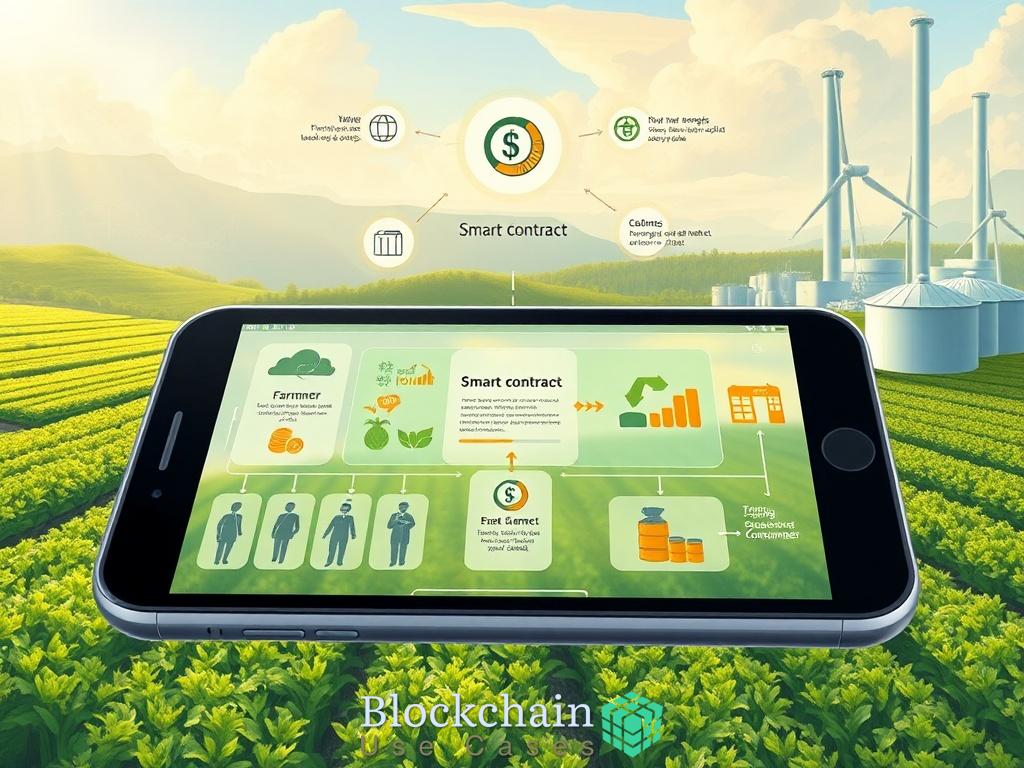Overview of Smart Contracts in Biomass Energy
The biomass energy sector is undergoing a significant transformation, driven by the need for increased efficiency and transparency. At the heart of this revolution are smart contracts—self-executing contracts with the terms of the agreement directly written into code. This technology promises to streamline processes, reduce transaction costs, and enhance trust among stakeholders in the biomass energy supply chain.
Understanding Smart Contracts
Smart contracts operate on blockchain technology, allowing for secure and immutable transactions. They automate workflows and enforce agreements without the need for intermediaries. In the context of biomass energy, these contracts can facilitate a range of transactions, from procurement of raw materials to the sale of energy. This automation minimizes human error and accelerates the entire supply chain process.
Benefits of Implementing Smart Contracts in Biomass Energy
Integrating smart contracts into the biomass energy supply chain presents numerous advantages. Below is a list summarizing the key benefits:
- Enhanced Transparency: All parties can access the same information, reducing disputes and fostering trust.
- Cost Efficiency: By eliminating intermediaries, operational costs decrease significantly.
- Speed: Transactions are executed automatically, resulting in faster processes.
- Improved Compliance: Smart contracts can be programmed to adhere to regulatory requirements, ensuring compliance.
- Data Security: The blockchain ledger is tamper-proof, enhancing data integrity.
Challenges and Future Prospects
Despite the promising benefits, the integration of smart contracts in biomass energy is not without challenges. Issues such as technological barriers, regulatory uncertainties, and the need for industry-wide standards must be addressed. However, as the technology matures and more stakeholders recognize its potential, the future of smart contracts in biomass energy looks bright. The ongoing development of blockchain solutions tailored for renewable energy could pave the way for a more efficient and sustainable energy ecosystem.
Benefits of Smart Contracts for Supply Chain Transparency

The integration of smart contracts into the biomass energy supply chain is not merely a technological advancement; it marks a paradigm shift in how transparency and accountability are maintained among stakeholders. This innovation fosters an ecosystem where information is readily accessible and verifiable, thus creating a culture of trust and collaboration.
Revolutionizing Information Flow
One of the most significant advantages of employing smart contracts in the biomass energy sector is the enhanced flow of information. Traditional supply chains often suffer from information silos, where data is confined to specific parties, leading to discrepancies and misunderstandings. In contrast, smart contracts operate on a decentralized ledger, allowing all authorized participants to access real-time data regarding transactions, performance metrics, and compliance statuses. This transparency minimizes the risk of disputes and provides a clear audit trail, which is essential for regulatory adherence.
Accountability and Trust Building
Moreover, the automated nature of smart contracts inherently increases accountability among supply chain participants. Each contract is executed based on pre-defined conditions, leaving no room for ambiguity. This feature not only reduces the potential for fraud but also encourages responsible behavior. When stakeholders know that their actions are continuously monitored and recorded on the blockchain, they are more likely to adhere to best practices, thus fostering a culture of integrity. As a result, trust among parties is significantly bolstered, which is a critical element in any successful supply chain.
| Feature | Traditional Supply Chain | Smart Contract Supply Chain |
|---|---|---|
| Information Access | Siloed Data | Real-Time Data Sharing |
| Accountability | Limited Oversight | Automated Execution |
| Trust | Dependent on Relationships | Built through Transparency |
In conclusion, the adoption of smart contracts in biomass energy supply chains not only enhances transparency but also cultivates an environment of accountability and trust. As stakeholders become more educated about these benefits, the momentum for their widespread implementation will likely accelerate, paving the way for a more resilient and efficient energy ecosystem.
Implementation Challenges in Biomass Energy Supply Chains

Technological Barriers: Overcoming Infrastructure Limitations
The integration of smart contracts into biomass energy supply chains is not merely a matter of deploying new software; it involves a comprehensive overhaul of existing systems. One of the most pressing technological barriers is the need for adequate blockchain infrastructure. Many companies within the biomass sector may lack the necessary hardware or software to support such advanced solutions. As a result, organizations must invest in not only the technology itself but also in the training of their workforce to effectively utilize these tools. Moreover, the interoperability between different blockchain platforms poses a challenge, as various stakeholders may employ different systems, making seamless integration difficult.
Regulatory Uncertainties: Establishing a Clear Legal Framework
As the biomass energy sector looks to adopt smart contracts, it is essential to address regulatory uncertainties that may hinder implementation. Current laws and regulations surrounding blockchain technology and smart contracts remain ambiguous in many jurisdictions. This lack of clarity can deter stakeholders from fully committing to this technological shift. To navigate these uncertainties, industry leaders must engage with policymakers to establish a coherent legal framework that not only embraces the innovations of smart contracts but also provides protections for all parties involved. Such collaboration is crucial in fostering a supportive environment for technological adoption.
Industry-Wide Standards: The Need for Collaborative Efforts
The establishment of industry-wide standards is a critical factor in the successful implementation of smart contracts in biomass energy supply chains. Without universally accepted guidelines, companies may find themselves in a fragmented ecosystem where interoperability is limited, leading to inefficiencies and increased costs. Stakeholders must come together to create a cohesive set of standards that govern the use of smart contracts, ensuring that all participants can communicate and transact effectively. This collaborative effort will not only streamline operations but also enhance the overall credibility and reliability of the biomass energy sector.
Case Studies of Smart Contract Applications in Biomass
Innovative Implementations in Biomass Energy
The transformative potential of smart contracts in the biomass energy sector is exemplified through a series of pioneering case studies. These real-world applications not only demonstrate the practical benefits of blockchain technology but also highlight how organizations are overcoming challenges to enhance operational efficiency and transparency. By examining specific instances of smart contract implementation, we can glean insights into the future trajectory of the biomass energy supply chain.
Efficiency in Biomass Procurement
One notable case involves a collaborative effort between a biomass producer and a local utility company aimed at streamlining the procurement process for raw materials. By employing smart contracts, both parties established a transparent agreement that automatically executed transactions based on predefined conditions, such as delivery schedules and quality metrics. This implementation drastically reduced the time spent on negotiations and administrative tasks, allowing the biomass producer to focus on optimizing production. Moreover, the clarity provided by the smart contract minimized disputes over delivery inconsistencies, fostering a stronger partnership built on trust.
Decentralized Energy Trading
Another compelling example is found in a pilot project that facilitated decentralized energy trading among small biomass energy producers. Utilizing smart contracts on a blockchain platform, these producers were able to sell excess energy directly to consumers without needing a centralized intermediary. This innovative approach not only increased profit margins for producers but also empowered consumers with more choices and competitive pricing. The transparency of the blockchain ensured that all transactions were verifiable, thereby enhancing consumer confidence in the integrity of the energy trading process. As these case studies illustrate, the application of smart contracts in biomass energy is not merely a theoretical concept; it is a tangible reality that is reshaping the industry’s landscape.
Future Trends of Smart Contracts in Renewable Energy
The landscape of renewable energy is rapidly evolving, and smart contracts are poised to play a pivotal role in shaping its future. As the adoption of blockchain technology gains momentum, the integration of smart contracts into biomass energy supply chains will drive innovation and efficiency. This section explores the anticipated trends that are likely to define the next phase of smart contract applications within the renewable energy sector.
Integration with Internet of Things (IoT)
One of the most promising trends is the convergence of smart contracts with IoT devices. By leveraging real-time data from sensors and smart meters, these contracts can facilitate automated decision-making processes in biomass energy operations. For instance, smart contracts could trigger payment transactions upon the successful delivery of biomass based on data collected from IoT devices monitoring quality and quantity. This synergy not only enhances operational efficiency but also ensures that all stakeholders are aligned in real-time, reducing disputes and fostering a more integrated supply chain.
Expansion of Decentralized Energy Markets
The development of decentralized energy markets is another trend that represents a significant shift in how biomass energy is traded. Smart contracts will enable peer-to-peer energy trading platforms, allowing producers to sell excess energy directly to consumers without intermediaries. This decentralization will empower smaller biomass producers, increase competition, and ultimately lead to more favorable pricing for consumers. As regulatory frameworks evolve to support these markets, we can expect an increase in the adoption of smart contracts to facilitate secure and transparent transactions.
Enhanced Regulatory Compliance and Reporting
As the biomass energy sector continues to grapple with regulatory challenges, the role of smart contracts in ensuring compliance is expected to grow. Future smart contract solutions will likely incorporate automated reporting features that streamline compliance with environmental standards and renewable energy mandates. By automatically documenting transactions and ensuring adherence to regulatory requirements, smart contracts will not only reduce the administrative burden on energy producers but also enhance accountability across the supply chain. This evolution will contribute to building a more sustainable and responsible energy ecosystem.
In summary, the future of smart contracts in the biomass energy supply chain is bright and full of potential. The integration of IoT, the rise of decentralized markets, and the emphasis on regulatory compliance are all trends that will shape this transformation. As stakeholders embrace these developments, the renewable energy sector will move toward a more efficient, transparent, and sustainable future.


















